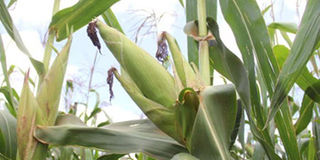Don’t rush to lift ban on GMOs, women tell State

Healthy maize crop in a farm in Kosachei, Uasin Gishu County. Women attending a recent public forum in Nairobi on GMOs and food security said they were worried about the lifting of the ban on GMOs and the continued sale of a pesticide blamed for causing cancer. FILE PHOTO| JARED NYATAYA
What you need to know:
- Kenya effected the ban against GMOs over safety concerns, riding on research that claimed that genetically modified maize has adverse effects on human health.
- Wanjiru Kamau, an organic farmer, argued that there is no consensus on the safety of GMOs around the world and, therefore, Kenya should not be in a hurry to adopt a technology whose safety is still in doubt.
- Dr Charles Waturu, the principal researcher on Bt cotton at Kenya Agricultural and Livestock Research Organisation (Kalro), observed that the ban on GMOs has made it harder to research and introduce the crop in the country even as he rooted for its lifting.
- International Service for the Acquisition of Agri-biotech Applications (ISAAA) AfriCenter, Bibiana Iraki-Kipkorir, the fear against GMOs is perpetuated by lack of scientific literacy.
As the government considers lifting the ban on genetically modified organisms, women lobbyists have stepped up opposition to the crops.
The women attending a public forum in Nairobi on GMOs and food security recently said they were also worried about the continued sale of a pesticide blamed for causing cancer.
Agriculture PS Hamadi Boga announced last month that talks were in top gear within the government to lift the ban on GMOs effected in 2012.
He noted that lifting of the ban would permit farmers to commercially grow the improved crops.
“The discussion has been going on and most of the things have crystallised by now. We have the necessary framework in place, we have regulation on how the technology will be applied in accordance with the best practices, and we have a very strong scientific community. As a country, we are at that point where we have to make a decision,” said Prof Boga.
Kenya effected the ban against GMOs over safety concerns, riding on research that claimed that genetically modified maize has adverse effects on human health.
Wanjiru Kamau, an organic farmer, argued that there is no consensus on the safety of GMOs around the world and, therefore, Kenya should not be in a hurry to adopt a technology whose safety is still in doubt.
“We have independent scientists in Europe and America saying GMOs are not safe and on the other hand, industry-supported scientists say they’re safe...whom do we believe?” she posed.
She noted that studies in the US suggested that chemicals and BET genes in GMO crops are able to pass through the placenta into the unborn baby when pregnant mothers eat crops with the genes.
Quite a number of trials on GMOs have been approved in Kenya, and are at various stages of testing, including drought-tolerant transgenic maize, virus- resistant transgenic cassava, vitamin-A-enhanced cassava and bio-fortified sorghum.
LACK OF SCIENTIFIC LITERACY
In 2016, the National Biosafety Authority (NBA) approved environment release of Bt cotton for limited National Performance Trials following an application by Monsanto Kenya Ltd in October 2015. This does not, however, allow for sale of the seed to farmers.
Dr Charles Waturu, the principal researcher on Bt cotton at Kenya Agricultural and Livestock Research Organisation (Kalro), observed that the ban on GMOs has made it harder to research and introduce the crop in the country even as he rooted for its lifting.
But in their opposition, the women argued that genetic engineering had not lived up to promises of increased yields, reduced inputs, consumer benefits, and the ever-critical goal of feeding the world’s booming population.
Jepkosgei Bett, a farmer in Uasin Gishu, said instead of government pushing for GMOs, it should promote organic farming.
“When I started farming in Eldoret, my maize did not produce much. My soil was tested and found to be too acidic. I was advised to add carbon and organic compost. I also mulch the crops. I stopped using fertiliser on my farm and this year I harvested 25 bags an acre from just five bags. I want the government to listen to me because our seeds have no problem. It is our soils we should be looking at,” she said.
However, according to the programme communications officer at the International Service for the Acquisition of Agri-biotech Applications (ISAAA) AfriCenter, Bibiana Iraki-Kipkorir, the fear against GMOs is perpetuated by lack of scientific literacy.
“These crops do not harm humans or other non-target organisms. These crops have been grown in over 28 countries around the world for over 20 years. And we’ve not seen any of the things being raised here happening. They’re being grown in the US and parts of Europe and these governments really care about their citizens and would not approve the production of GMOs if they were harmful to humans,” she noted.
Judith Kiminywe, a professor at Kenyatta University in the Department of Food Nutrition and Dietetics, said that the government needs to listen to the views of women before making a decision on the ban and called for innovation in the way food distribution in the country was being done.




